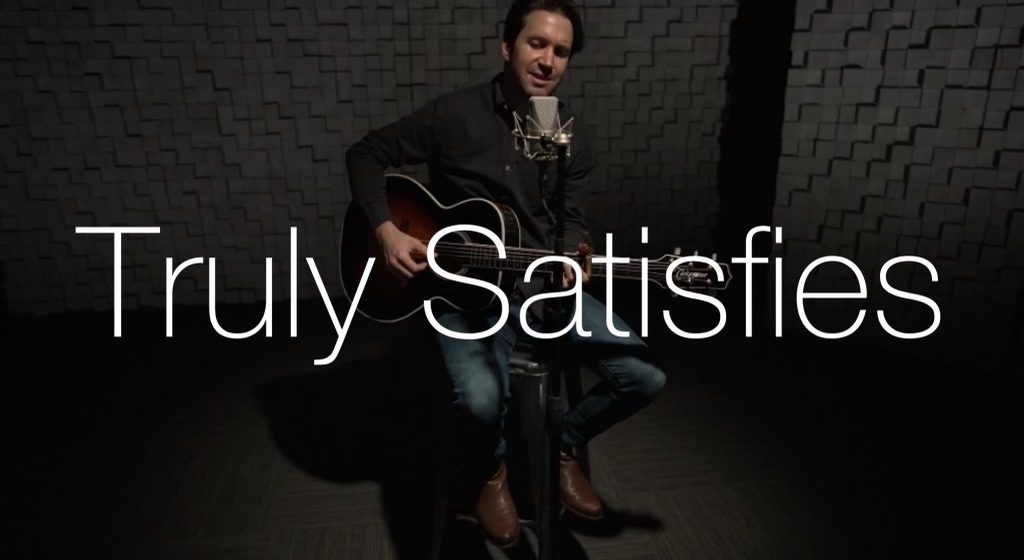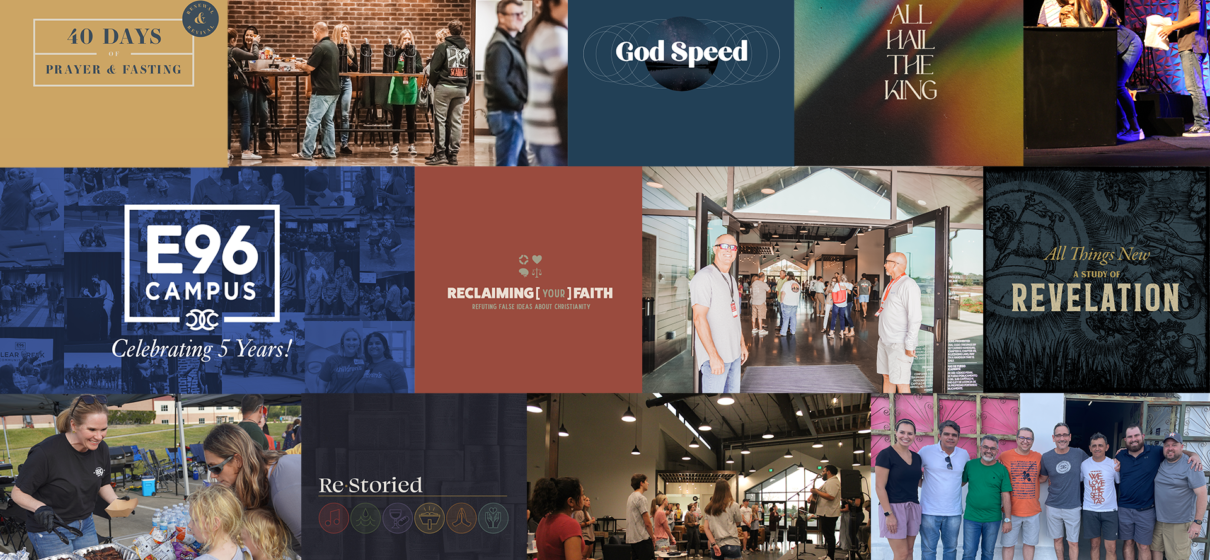165: 2022 Year In Review
As we end 2022, what are you celebrating?
How have you seen God move in your life, your family, and as a church?
On this special “Year In Review” episode, Aaron Lutz sat down with Ryan Lehtinen and Kyle Mikulan to look back on the year that was and look forward to a new year personally and as a church family.
Mercies (Great Is Your Faithfulness)
Mercies (Great Is Your Faithfulness) is an adaptation of Lamentations chapter three.
It’s a song that recounts the faithfulness of God through every season of life.
It’s a song to the God who has and always will keep his promises to us in Jesus.
157: Restoried in Song – Worship that Transforms
What if worship was more than the songs we sing, but served as a way of re-shaping how we see God and the world?
What if worship regularly reminded us of a greater story God is telling?
In this episode of the Clear Creek Resources Podcast, Aaron Lutz sits down with two of our worship leaders, Brad Loser and Tanner Smith, to talk about worship that transforms us and worship that re-stories us in the gospel.
MORE RESOURCES: All Hail The King out now!
Why We Sing (Christmas Edition)
During Christmas of 1914, soldiers huddled together in trenches to keep from freezing all along the western front of World War I.
On one side the Allied troops (the British, Belgians, and French) with the Germans on the other.
Since the war began the summer before, men and women from both sides had witnessed and participated in the bloodiest conflict the world had ever seen. Many soldiers who had survived the horrific living conditions and brutal fighting were left shellshocked, distraught, longing for home, and wishing the war would come to an end.
But on the night of Christmas Eve something miraculous happened.
Albert Moren , a British private, described hearing songs coming from the enemy trenches:
“First the Germans would sing one of their carols and then we would sing one of ours, until when we started up ‘O Come, All Ye Faithful’ the Germans immediately joined in singing the same hymn to the Latin words Adeste Fideles. And I thought, well, this is really a most extraordinary thing — two nations both singing the same carol in the middle of a war.”
By the morning, the Allied and German troops emerged from their respective trenches and, after having agreed to a ceasefire, spent much of Christmas day together.
It’s said that they exchanged gifts, played soccer, ate food together, and commiserated with one another as if they were no longer sworn enemies.
This event has become known as the Christmas Truce of 1914 and to this day there is no other recorded truce in history like it.
Of course, the truce didn’t last forever. The soldiers eventually climbed back into their trenches and the fighting continued.
But this event left a lasting mark on history.
On that bitter cold night in 1914, it was the songs about the birth of Jesus, sung by supposed “enemies,” that reminded those men of that truth and allowed them to lay their weapons down.
Beyond being a story that offers a glimmer of kindness and peace amidst a world that often feels at war with itself, this event reminds us that, more than which side we’ve fought for, we are united by the unshakeable hope that is only found in the advent of Jesus Christ.
The reality for us today is that as followers of Jesus, we know our hope and our identity will always and forever be found in Christ and what he has done for us.
And so, when we gather and sing, we are reminding one another and proclaiming with one voice that death, war, and sin will never divide us into enemy camps; we are leaving our “trenches” and reclaiming our title as the united body of Christ.
So, church family, let’s lay our weapons down at the feet of Jesus our King and worship him well this Christmas season!
Heart of the Song: Silent Night
I grew up thinking everything I heard in Christmas songs was literal. There really were nine reindeer and they pulled Santa’s sleigh in the exact order of the song we all sang together! And I really did need to watch out and not cry because Santa Claus had some level of magical surveillance and was coming to town.
So, in the same way, when it came to the Christmas hymns we sang at church, I latched on to those lyrics, not as artistic interpretation, but as facts about the birth of Jesus.
When I grew up I learned that the reindeer often ride in a different order, Santa uses our parents as informants, and the beauty of the words of many of our carols tell more than the facts of the story of the first Christmas. They speak to the heart of the night Jesus was born.
One of my favorite Christmas songs is “Silent Night,” but the three verses of the song describe a night that should have been anything but silent.
Silent night, holy night
All is calm, all is bright
Round yon Virgin Mother and Child
Holy Infant so tender and mild
Sleep in heavenly peace
Sleep in heavenly peace
Silent night, holy night
Shepherds quake at the sight
Glories stream from heaven afar
Heavenly hosts sing Alleluia
Christ, the Savior is born
Christ, the Savior is born
Silent night, holy night
Son of God love’s pure light
Radiant beams from thy holy face
With the dawn of redeeming grace
Jesus, Lord at thy birth
Jesus, Lord at thy birth
The night Jesus was born must have been a whirlwind of activity. First, Joseph and Mary couldn’t find a hotel room. Then Mary went into labor in a barn and gave birth as a young teenage girl. And none of that is to mention angels appearing out of a dark night sky scaring the shepherds to death!
And all of that was just the beginning. The next day began the 33 years of Jesus’ life; years that can be described as anything but peaceful and silent.
I don’t know if you have ever had the experience of being in the eye of a hurricane. It is a unique moment that is hard to adequately explain. I have had the experience twice. Once in Hurricane Alicia when I was really little, and a second time in Hurricane Ike. I remember being inside the house as the winds pounded for hours shaking the house and the windows. I could hear debris slapping against the roof and the walls. Then in the middle, suddenly there was this calm stillness. And silence. It’s this moment of peace with storms having passed and more on the way.
Many of us have held a newborn child at some and understand the joy and hope that new life brings. If you’re a parent, you probably remember that moment of holding your child for the first time, having come through the journey of labor, and knowing that everything would be different from that point on.
But on Christmas, the baby was not just any baby. He was the incarnation of God himself. The night probably wasn’t perfectly silent, but it was full of promise that everything would be different from that point on, not just for Mary and Joseph, but for the entire world.
It was the promise of salvation to a world desperately needing peace and rest.
Our own lives are rarely silent either. But, no matter the noise, chaos, or storm we are facing, we can experience this joy, hope, peace, and love in the presence of Christ our King.
Heart of the Song: O Come All Ye Faithful
The Christmas story opens in Bethlehem over 2,000 years ago. Joseph and a very pregnant Mary had traveled a long way to the hometown of their family to participate in a census decreed by Caesar Augustus. The local inns were over-crowded and so Mary and Joseph found themselves settled down for the night among livestock and cattle as Mary delivered the Savior of the world.
Meanwhile, not too far away, a group of shepherds were keeping watch over their flock, undoubtedly unsuspecting of the wonders they would behold a few hours later.
In that day, being a shepherd meant taking constant care of your flock. It wasn’t a lucrative business, and these men were often viewed more as nomads than actual community members. This is probably why the shepherds had not dispersed to be counted in their home-lands like the rest of the country. They simply weren’t considered significant enough to count.
And so it was that this particular group of shepherds were resting with their flock in the fields outside Bethlehem on the night of Jesus’ birth. We read their story in Luke chapter 2.
| And an angel of the Lord appeared to them, and the glory of the Lord shone around them, and they were filled with great fear. And the angel said to them, “Fear not, for behold, I bring you good news of great joy that will be for all the people. For unto you is born this day in the city of David a Savior, who is Christ the Lord. And this will be a sign for you: you will find a baby wrapped in swaddling cloths and lying in a manger.”
– Luke 2:9-12 |
O come, all ye faithful,
joyful and triumphant! O come ye, O come ye to Bethlehem! Come and behold him, born the King of angels.
O come, let us adore him, O come, let us adore him, O come, let us adore him, Christ the Lord!
|
It’s noteworthy God didn’t choose any of the political or religious leaders of that day or really anyone of “importance” to be the first to hear and spread this news.
The angels could have appeared anywhere and to anyone. Yet God chose this lowly group of unsuspecting men to be the first to hear about the birth of the Messiah — Jesus Christ, God in flesh, born in the middle of the night to young parents and in a stable.
| And suddenly there was with the angel a multitude of the heavenly host praising God
and saying, “Glory to God in the highest, – Luke 2:13-14 |
Sing, choirs of angels,
sing in exultation! Sing, all ye citizens of heav’n above! Glory to God, all glory in the highest
O come, let us adore him, O come, let us adore him, O come, let us adore him, Christ the Lord! |
The shepherds heard the most important news in the history of the world from the mouths of angels of heaven! The long-awaited Messiah had come.
Can you imagine what an utterly overwhelming experience that must have been?
| When the angels went away from them into heaven, the shepherds said to one another, “Let us go over to Bethlehem and see this thing that has happened, which the Lord has made known to us.” And they went with haste and found Mary and Joseph, and the baby lying in a manger…
– Luke 2:15-16
|
Yea, Lord, we greet thee,
born this happy morning; Jesus, to thee be all glory giv’n! Word of the Father, now in flesh appearing
O come, let us adore him, O come, let us adore him, O come, let us adore him, Christ the Lord!
|
Shell-shocked and probably filled with wonder, the shepherds dropped everything to seek out the newborn Jesus. They went to find the Messiah; not to ask anything of him; not even to bring him gifts as the Magi would later do. For what did they possibly have to offer?
They simply went to see if it could possibly be true, and to worship him if it was.
They went to adore him.
And after they’d seen him, they went and told as many people as they could what had happened, who had come, and what the angels said about him.
And this is exactly what we do when we gather together and celebrate this same incredible news over 2,000 years later.
When we think about the words of “O Come All Ye Faithful,” singing together with our families and our neighbors and church-family on Christmas Eve, we are reminded of the great lengths to which God went through in order to reconcile us to him. We celebrate Christ’s birth knowing something the shepherds didn’t — what he accomplished in his death and resurrection.
But, on this side of the Gospel, we can still respond in similar fashion to those few humble men: worship.
Our status, wealth, and pasts don’t disqualify us.
We can simply come and adore him, revelling in the splendor and majesty of God’s grace gifted to us through Christ the Lord.
Heart of the Song: Angels We Have Heard on High
As a songwriter, there are few things worse than playing for a room full of people who don’t care you’re there.
Here you are singing your soul out, sharing the intimate thoughts and emotions of your heart, and people are content to just keep looking at their phones or talking loudly over their drinks, as if all you are is the background music to their conversation.
On the other hand, few are the moments as significant as a room full of starry-eyed people listening or singing along to their favorite artist journeying alongside them as he or she expresses themself through the art of song.
Now allow me to remind you of the most elaborate, magnificent, awe-inspiring musical display in history you probably don’t know you know about.
The scene is found in Luke chapter 2. Jesus, the King of kings had just been born to a virgin in a grimy stable outside of an inn in the city of Bethlehem. The God of the universe sent his only son to redeem mankind from the tyranny of sin and death.
Now that he was born, the Father wanted to celebrate and announce his arrival.
So, what did he do?
He sent a mighty messenger angel and a multitude of angelic hosts singing the praises of God.
Luke 2:10-14 recounts it:
And the angel said to them, “Fear not, for behold, I bring good news of great joy that will be for all the people. For unto you is born this day in the city of David a Savior, who is Christ the Lord. And this will be a sign for you: you will find a baby wrapped in swaddling cloths and lying in a manger.” And suddenly there was with the angel a multitude of the heavenly host praising God and saying,
“Glory to God in the highest,
and on earth peace among those with whom he is pleased!”
Now, we need to pause for a second and shake off the familiarity of this passage to really appreciate it. We’ve heard this story read time and time again, and we’re all familiar with the song “Angels We Have Heard on High.”
But there’s more to this story than simply recounting a wild night of singing angels.
You see, there’s a brilliant irony hidden inside this text that gives us an insightful glimpse into the heart of God the Father.
The people of Israel had awaited a Messiah — a savior to come and rescue them from the tyrannical Roman government and be the powerful political figure they needed.
What they didn’t realize was that there was a greater enemy than the Roman empire.
They were slaves to sin itself and didn’t know it.
So, on the night of the singing angels, this redeeming King had finally arrived.
Who would be the first to know? Who would be the audience for this grand announcement?
If you’ve ever had a child, who were the first people you told?
Your parents?
Your best friends?
My guess is it was probably the people who would have been most excited. The people who were waiting with anticipation, and upon being informed would probably cry or laugh or jump at the opportunity to come and celebrate this life-changing moment with you.
So, who would be the first to know that King Jesus was born?
Surely it would be the religious elite!
Or perhaps those in political authority.
Even close family members to Mary and Joseph would have made sense.
To whom would God deliver this incredible news on the night of our Savior’s birth?
Well, God, in his infinite wisdom, didn’t choose to reveal this magnificent news to any of those suspecting audiences. Instead, he chose — wait for it — shepherds.
In ancient times shepherds were filthy, smelly, blue collar, non-prestigious outsiders. They weren’t the ones invited to social gatherings, or guests at the important dinners, they were not to be trusted, informed, or honored.
So why would God send his majestic messengers to sing the birth of the King of kings to these guys?
Throughout Scripture we continually see this type of behavior from God.
He often chooses to reveal his heart to and through the least likely characters.
The typical audience of the King’s “concerts” all throughout the gospels were sinners, harlots, the marginalized, and the unclean.
Why is that?
God often invests himself into outcasts and outsiders because they are the ones who will humbly receive what he has to say and do something with it. Those who feel righteous and self-sufficient have no need of a savior or a savior’s song.
The night Jesus was born, the angels appeared to a group of guys who would appreciate it.
Do you think the politically elite, the religious leaders, or even Jesus’ own family members would have appreciated or believed the message of the angels?
They were looking for a savior of their own size and proportions. They had their own expectations, which didn’t include someone who would save them from their sins.
I wonder, if Jesus was born in our time, who would have been the audience at the concert?
Would it have been you or me?
Or would we — do we — overlook the good news of Jesus all the time as it is?
Every single day, the gift of the Gospel, the beauty of another day, and the grace and mercy of God are a sight and song that should leave us exclaiming “In Excelsis Deo!” or “Glory to God in Highest!”
Yet here we are, distracted, staring at our phones, talking loudly over our drinks and missing the majesty of the moment.
Today, we can be the recipients of the Good News. Peace on earth, good will towards men.
If only we’ll listen.
115: It’s Beginning to Sound a Lot Like Christmas
‘Tis the season to celebrate! Thanksgiving has come and gone and now we turn all of our attention to Christmas. On this episode, our Clear Lake Campus worship leader, Brad Loser, sits down with two of our other campus worship leaders, JJ Cole and Aric Harding. They talk about some of their favorite Christmas traditions, the Christmas song they hate to hear, and discuss the new Christmas album that the Clear Creek Arts Team recently released.
109: Why Should I Show Up to Church?
During the series Salty: Sticking Out for the Right Reasons, we’re discussing questions related to each message on our podcast. On this episode, Ryan Lehtinen, Yancey Arrington, and Aaron Lutz discuss the questions: What is the church? And why is it important for the church to regularly gather together for worship?
Resources:










